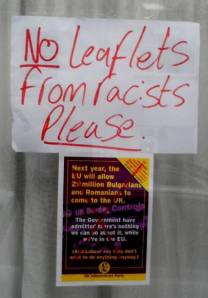The Hanover and Elm Grove by-election is the second such event I have covered with a pinterest board, the first being the East Brighton by-election of last year. As explained here it started following a realisation that local election leaflets were very hard to find online. It struck me as odd; It almost seemed that political parties didn’t want the wider world to know what they were stuffing through peoples letterboxes. It became odder as I noticed that the best place to get online versions of election leaflets was from the blogs and websites of rivals to the party that produced them.
Assuming that candidates and their parties were proud of their policies, why let them be found online only in hostile places? Perhaps candidates didn’t want their promises preserved – or more particularly to be reminded of the terrible things which they claimed would follow the election of their nemesis.
Thinking it important that things parties state or claim in order to get our vote should be more enduring than the contents of next weeks recycling box was the main reason for setting up this resource. A thing for residents rather than politicians, and less concerned with who wins than with how they won it and what they said along the way. A small project for the betterment of democracy.
Such things are not however straightforward…
At the East Brighton by-election troubles came as two rival parties developed a squabble about the propriety of using the personal address of candidates as a political weapon. Although the list which I had pinned came directly from the council website, where candidate details are a matter of public record, I did feel bothered at being drawn into this aspect, as it wasn’t an entirely pleasant debate. Learning from this, for the current by-election I pinned just the names and parties of those standing for election and not the addresses.
This election process has been fairly straightforward…until now. Over the weekend, the Green Party distributed a leaflet concerned with recent events of note in the city and entitled ‘Bin Strike and Equal Pay Factsheet’ (for those interested it can be found here P1 & P2 ). Finding it on my doormat, I pinned it to the board. Shortly thereafter I had a Twitter exchange with @Annie3H who pointed out that the leaflet wasn’t really by-election specific and questioned its inclusion on the board. On reflection I agreed with her, corrected this oversight and unpinned it.
https://twitter.com/sbtxt/status/351238984300638208
I replaced the pin with a brief explanatory note and a link to my Tumblr site where it could still be viewed and thought no more of it. It was quite a surprise for me then, to spend much of Sunday in online conversation with Labour activists demanding that a Green Party leaflet be given more publicity and should be re-pinned. Local politics can be a strange and unusual place!
I haven’t re-pinned it though, as I think that Annie was right, and that the board isn’t simply for anything to do with Brighton politics which happens during the by-election period, but is specifically about exploring how candidates approach individual wards. My interest is in the extent to which parties properly engage with neighbourhoods, uncover issues and respond with clear and positive policies, rather than just being a conduit for more general party lines.
The Green Bins leaflet isn’t the first to have been missed off the #heg13 pin-board for this reason; last week a ukip leaflet made its way through the letterbox. Rather than considering Brighton issues, their material rather focussed on fearmongering about events in Bulgaria and Romania. As it didn’t mention any Hanover & Elm grove specific policy or mention the by-election it became first victim of my non-local edict (is this ironic?).
I didn’t keep a copy of this leaflet, but happily the chap over the road put one in his window which I have copied below for illustration.
I’m not completely certain, but I think that the positive comments and views from people across the spectrum which I have received indicate that curating election materials like this is probably useful and helpful. I think that over time it could form an interesting resource – a social history collection as much as a political record, and so I will keep it up for now.
I expect that each election will throw up its own issues and controversies and judging how best to present this sort of collection will take ongoing tweaking and learning. Comment advice and suggestion on how this should best be done most welcome.

